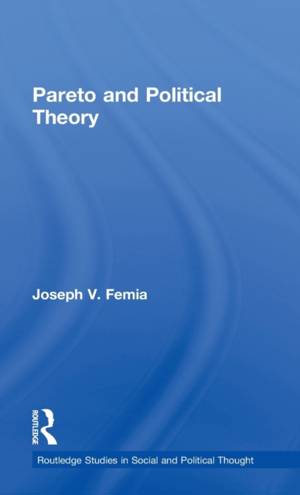
- Afhalen na 1 uur in een winkel met voorraad
- Gratis thuislevering in België vanaf € 30
- Ruim aanbod met 7 miljoen producten
- Afhalen na 1 uur in een winkel met voorraad
- Gratis thuislevering in België vanaf € 30
- Ruim aanbod met 7 miljoen producten
Omschrijving
Pareto and Political Theory is the first book-length study of the philosopher's importance in terms of the most fundamental issues of political discourse: individualism vs. holism, science vs. hermeneutics, laissez-faire vs. social engineering, and value relativism vs. moral absolutism.
Joseph V. Femia shows that although Pareto is considered a 'founding father' of both sociology and mathematical economics, his contribution to political theory is neither fully recognised nor properly explored. This is also the only book to examine Pareto's critique of Kantianism and natural law and also includes the first comparison of Pareto's thought with postmodernism and a detailed refutation of the familiar charge that Pareto was a defender of fascism.
This critical, but sympathetic analysis refutes the familiar charge that Pareto was some sort of proto-fascist and instead locates him in the Machiavellian tradition of 'sceptical liberalism', which scorns metaphysical abstraction and assigns ontological primacy to the individual. Though suspicious of rational schemes for human improvement, sceptical liberals are equally suspicious of the myths and rhetoric that sustain the status quo. This new volume concludes with a fascinating comparison between Pareto's scepticism and that of recent postmodernist thought, which also debunks the 'grand narratives' of historical progress.
This book will be of great interest to all students of politics, philosophy and sociology.
Specificaties
Betrokkenen
- Auteur(s):
- Uitgeverij:
Inhoud
- Aantal bladzijden:
- 176
- Taal:
- Engels
- Reeks:
- Reeksnummer:
- nr. 48
Eigenschappen
- Productcode (EAN):
- 9780415288132
- Verschijningsdatum:
- 3/08/2006
- Uitvoering:
- Hardcover
- Formaat:
- Ongenaaid / garenloos gebonden
- Afmetingen:
- 142 mm x 223 mm
- Gewicht:
- 317 g

Alleen bij Standaard Boekhandel
Beoordelingen
We publiceren alleen reviews die voldoen aan de voorwaarden voor reviews. Bekijk onze voorwaarden voor reviews.











